The National Committee for Space Research (INCOSPAR) laid the foundation for the formation of the Indian Space Research Organization (ISRO). INCOSPAR was set up in the year 1962 by the Government of India in order to start the research about space. Dr. Vikram Sarabhai was the main visionary who played a vital role in the setup of Thumba Equatorial Rocket Launching Station (TERLS) in the capital city of Kerala in order to conduct research on the upper atmosphere. After this, ISRO superseded INCOSPAR in the year 1969 after the importance of research in Space as well as technology for national development was understood, thanks to Vikram Sarabhai.
The main vision and mission behind the establishment of ISRO were to offer services based on space and be able to develop these technologies independently within the country without any external help. Interestingly, ISRO has not only succeeded in fulfilling its mission and vision but also became one of the 6th largest space research agencies around the world. ISRO has also been successful in reaching out with its space services to the nation as well as the common man. There are many significant achievements of ISRO that has made India very proud. Some of the achievements are as follows:
- INSAT: The Indian National Satellite System (INSAT) is one of the groups of satellites launched by ISRO that helps in telecommunication, meteorology, broadcasting, rescue operations and much more. It is managed by ISRO and is one of the biggest communication system satellites in the region of Asia Pacific. It helps in reliable communication.
- IRS: The Indian Remote Sensing Program (IRS) started in the year 1988 by ISRO. The first satellite that was launched under this program was IRS-1A. This was one of the biggest moments for ISRO because it reflected that the space research programs of ISRO were becoming mature. It helps in the observation of Earth.
- PSLV: Polar Satellite Launch Vehicle (PSLV) is a launch vehicle that was designed and is also operated by ISRO. It was developed with the idea to help ISRO in its launch of IRS satellites which was only available with Russia prior to the launch of PSLV. It is very credible for launching small satellites into the orbit and is one of the most significant achievements of ISRO.
These space programs and much more have been remarkable in showing the efforts that the scientists at ISRO have put in to make the Indian Space Program a grand success.
ISRO space programs aim at developing and delivering satellites as well as tools that improve the daily lives of a common man. Therefore, they focus on providing better weather forecasts, communications, disaster management tools, broadcasts, cartography, telemedicine, navigation, Geographic Information System, and much more. Overall, the ISRO Indian Space Program aims at making the lives Indians more convenient by learning more about space.
Apart from the advancements in technology, ISRO also made major contributions in the scientific research arena. There are many space research centers as well as autonomous space institutions that are dedicated to conducting regular research on astrophysics, astronomy, remote sensing, space sciences in general as well as atmospheric sciences. Some other critical scientific projects of ISRO Indian space program include interplanetary missions and lunar missions that contribute towards promoting education in the field of space research. Moreover, it offers some fascinating and valuable data that enrich the scientific community.
Thanks to a great foundation and some outstanding scientists at ISRO, India has made an indelible mark in space research worldwide. The contributions of Indian space research are lauded by the scientific community worldwide. ISRO continues with its space research and plans to develop human spaceflight projects, heavy lift launchers, semi-cryogenic engines and much more.





